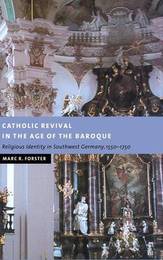
|
Catholic Revival in the Age of the Baroque: Religious Identity in Southwest Germany, 1550-1750
Hardback
Main Details
Description
This book is a study of Catholic reform, popular Catholicism, and the development of confessional identity in southwest Germany. Based on extensive archival study, it argues that Catholic confessional identity developed primarily from the identification of villagers and townspeople with the practices of Baroque Catholicism - particularly pilgrimages, processions, confraternities, and the Mass. Thus the book is in part a critique of the confessionalisation thesis which currently dominates scholarship in this field. The book is not however focused narrowly on the concerns of German historians. An analysis of popular religious practice and of the relationship between parishioners and the clergy in villages and small towns allows for a broader understanding of popular Catholicism, especially in the period after 1650. Local Baroque Catholicism was ultimately a successful convergence of popular and elite, lay and clerical elements, which led to an increasingly elaborate religious style.
Reviews'... an invaluable contribution to the history of Catholic revival in Germany and has profound implications for other areas of Europe as well.' Journal of Ecclesiastical History 'Forster's approach, in short, is a compelling one and has the added virtue of making the German experience more comparable with other parts of Catholic Europe.' English Historical Review Forster's work illuminates central features of Baroque Catholicism and underlines the limitations of the theory of confessionalisation as a model of the development of early modern German society and the religious experience of its members.' Joachim Whaley, German History 'Forster's approach, in short, is a compelling one and has the added virtue of making the German experience more comparable with other parts of Catholic Europe.' Oxford Academic Journals '... a vivid and nuanced picture of the relations between secular rulers, the Catholic clergy, and their blocks ... the book makes a wonderful introduction to the religious history of eighteenth-century Europe.' The Historical Journal '... a significant contribution to the specialist literatures on German and religious history.' Religious Studies Review
|